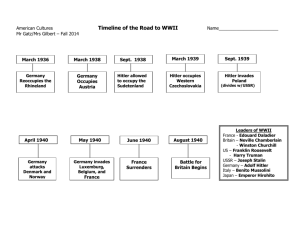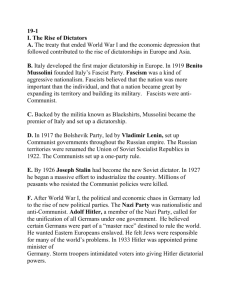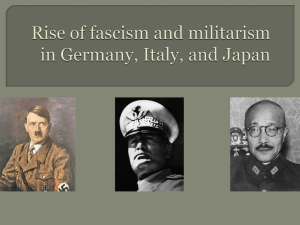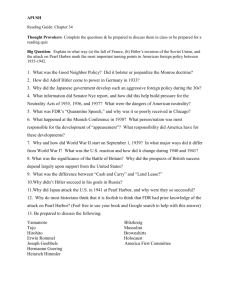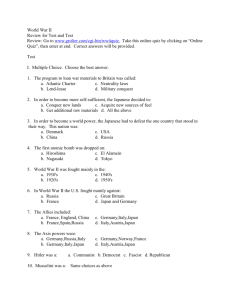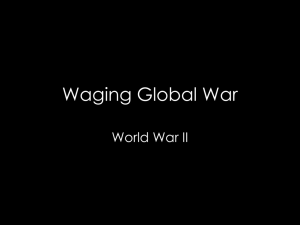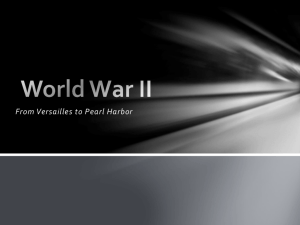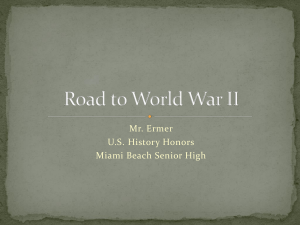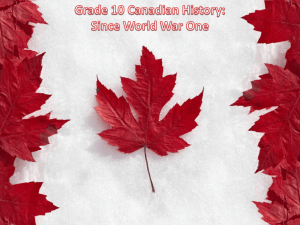The Shadows of War Chapter 24 AP Notes
advertisement
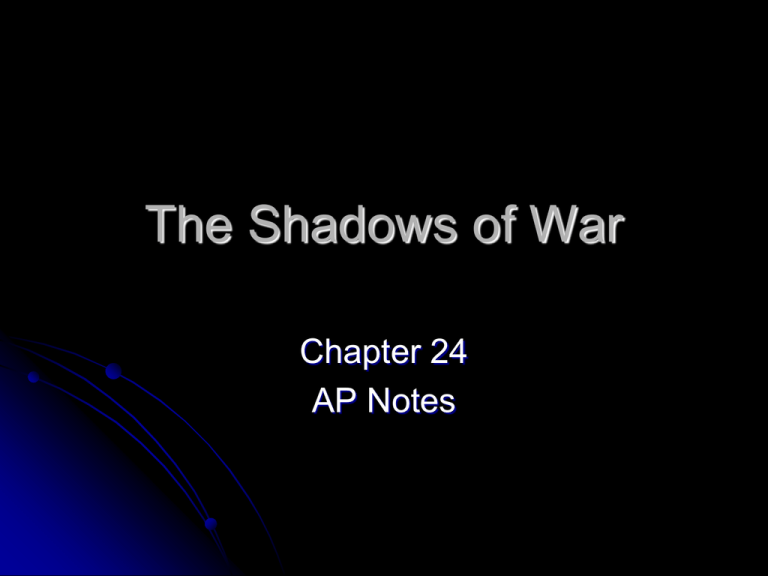
The Shadows of War Chapter 24 AP Notes London Economic Conference 66 nations Goal: stabilize currencies by organizing a global attack on the depression U.S. refused to participate …. Effect …. Philippines Tydings-McDuffie Act of 1934 Independence for Philippines in 12 years U.S. gave up army bases Retain naval bases Economic limitations Rationale Maintaining empire was expensive Labor resented competition of low wages Am sugar resented competition Effect Japan believed they had nothing to fear from U.S. Soviet Union Recognized Soviet Union in 1933 Trade Bolster Europe the S.U. to offset fascism in Latin America Good Neighbor Policy FDR renounced armed intervention FDR wanted to form friendships and support to help protect W. Hemisphere Marines pulled out of Haiti Cuba released from Platt Amendment Relaxed grip on Panama Reciprocal Trade Agreement 1934 Sec. of State Cordell Hull Low tariffs – amended Hawley Smoot rates – could lower as much as 50% as long as corresponding country did same 21 pacts by 1939 Designed to lift Am. exports – relief and recovery Reversed high protective tariff policy Led way for free-trade international economic system Rise of Dictators Rise • of dictatorships during 1920s in Germany, Italy, and Japan Fascism: -totalitarian organization of government and society by a single-party dictatorship, intensely nationalist, racist, militarist, and imperialist Communism v. Fascism Poor and underdeveloped countries – Russia and China Pre-democratic Coercive way of industrializing an underdeveloped society Wealthier and advanced technology – German, Italy, and Japan Post-democratic Based on brutality and mass support – the more brutal, the more popular Propaganda Appealed to: industrialists and land owners and lower middle class Opposed communism Italy – Benito Mussolini Short changed in Treaty of Versailles 1919 formed Fascist party with other veterans Wanted to restore the former glory that was Rome’s Mussolini – Il Duce 1922 threatened to march on Rome unless his authority was recognized King Victor Emmanuel III asked him to become prime minister 1925- declared dictatorship Efficiency and order would make Italy great Suspended elections Centralized the economy Modernized the military Make the Mediterranean an Italian Sea – Attacked Ethiopia in 1935 Italo – Ethiopian War 1935-36 Italy attacked primitive Ethiopia with a modern air force Emperor Haille Salasi appealed to the L of N League branded Italy the aggressor nation Minor economic sanctions Failed to embargo oil Italy conquered an annexed Ethiopia Hitler Corporal in WWI Enraged at Germany’s defeat and terms of Versailles Treaty National Socialist German Workers Party - Nazi Munich Putsche November 1923 Attempted to seize Munich Hitler was guilty of high treason Jailed for 9 months Wrote Mein Kampf Mein Kampf Book written while Hitler was jailed Diagnosed Germany’s problems and how to cure them Expressed hatred for the Jews and Russians Hatred for communism Said Germany needed Lebensraum Conditions in Germany People had little faith in the weak existing democratic government A multi-party system hindered the growth of a strong “center” party Fear of communism Avenge defeat of WWI Unemployment severe, inflation, depression Conditions in Germany German middle class hungered for stability – even at the cost of liberty Police and military high command offered no serious opposition when Nazis used strong-arm methods to gain control Rise to Power 1920 – National Socialist Workers Party 1923 – Tried to seize Munichjailed for 9 months Promised to stabilize country and rebuild economy Promised to revive German Empire 1933 – Nazis largest party in Reichstag Hitler named chancellor Hitler Seizes Power Reichstag burns down Hitler suspended civil liberties Received dictatorial powers New government – Third Reich Der Fuhrer Anti-Semitism Hatred of the Jews Blamed Jews for Germany’s problems Germans were the Master Race Ordered boycott of Jewish shops, burned books, imprisoned Jews in concentration camps Neutrality Acts Designed to avoid the same issues that caused U.S. to enter WWI 1st Neutrality Act Prohibited sale of war implements to belligerents Prohibited loans to belligerents Prohibited Am. From sailing on ships of belligerents Restricted entry of U.S. merchant ships into war zones Japan Wanted to be a world power Chain of islands in Pacific Limited resources Japan needed raw materials for industrial economy Depended upon the U.S. for iron, coal, and petroleum Two factions in Japan Moderates – wanted strict observance of treaties and conciliations to U.S. Militarists – wanted an end to the power of the West in the W. Pacific Roots of American Isolationism Disillusioned by WWI….. Nye Committee ….. America First Committee – Henry Ford – Charles Lindbergh – denounced any move by the gov’t toward involvement Spanish Civil War 1936-37 Rebels – army, Churchmen, fascists – Franco Gov’t of Spain – anticlericals, industrial workers, socialists, and communists Italy and Germany sent “volunteers” to help the Rebels S.U. sent volunteers and arms to gov”t Spanish Civil War 27 nations involved England and France embargoed arms to both sides because of danger of world war Majority of Am. Refused to take sides Minority of Am. Supported loyalists – Abraham Lincoln Brigade U.S. invoked neutrality laws and refused to sell arms Dress rehearsal for WWII Sp. Civil War Franco won Loyalists fell from power 1931 – Moderates in Japan weaken Naval limitations placed upon Japan were degrading Great depression American racial discrimination not forgotten Northern advance of the Chinese Nationalists made future of Manchuria uncertain Military responsible to the Emperor Japanese resentment Resented dependency High U.S. tariffs prohibited Japanese imports to U.S. Japan couldn’t sell in the U.S. Led to prolonged depression in Japan Greater Asian Co-Prosperity Sphere Japanese Monroe Doctrine Japan announces interest in maintenance of order in the W. Pacific 1931 Japan attacked Manchuria 1932 Japan controlled Manchuria Set up a puppet government Manchukuo League of Nations condemned Japanese aggression Japan continued Japanese aggression 1937 – Shanghai – Nanjing – Beijing Belief in American weakness Neutral position on Manchurian Crisis Steps toward Philippine independence Efforts toward American Naval disarmament Undeclared War July, 1937 – an “undeclared” war on China Americans are sympathetic and do not invoke neutrality laws Oct. – L of N condemned Japan FDR – Quarantine Speech – denounced aggressor nations and asked peace-loving nations to preserve order, as “a community approves and joins in quarantine” against disease Panay Incident U.S. gunboat on the Yangtze River Japanese attacked in broad daylight 2 Americans killed and other wounded Engaged in legitimate business Flying the American flag in broad daylight We protested and they apologized Hitler Repudiates the Treaty of Versailles 1. 2. 3. 4. Insisted on equality of arms Announced withdrawal from League of Nations 1935 – announced rearmament of Germany Remilitarized the Rhineland – 1936 – a section of W. Germany from which Treaty of Versailles excluded German forces after WWI Treaty of Versailles Con’t 5. 6. 7. Formed the Axis with Mussolini – 1936 – pledged to protect Europe from communism Annexed Austria – 1938 – Anschluss Demanded Sudetenland – 1938 – part of Czechoslovakia inhabited by ethnic Germans – Czech began to mobilize and had treaties with France and S.U. Munich Conference 1938 Great Britain and France met with Hitler Hitler said “last territorial claim” Chamberlain of G.B. said: “We have won peace in our time.” Appeasement Policy of G.B. and France toward Hitler Keep peace by giving in to Hitler’s demands – Gave Sudetenland to Hitler Repudiation of Treaty Con’t Germany overran all of Czech by 1939 9. 1939 Germany and S.U. announced a non-aggression pact 10. Germay attacked Poland – Sept. 1, 1939 11. England and France declared war against Germany – Sept. 3, 1939. 8. Challenges to Neutrality Sept. 1939 to April 1940 – “Phony War” Neutrality laws amended to “cash and carry” April, 1940 attacks began – Blitzkrieg – Denmark, Norway, Netherlands, Belgium, and Luxembourg Fall of France Maginot Line Maginot Line Fall of France 11 days Maginot Line Germans invade through the Ardennes Forest Evacuation at Dunkirk – “Miracle at Dunkirk” – 338,000 British soldiers evacuated Italy declared war against France Paris Falls – June, 1940 Fall of France Italy declared war - attacked from the south – “knife in the back” Occupied France – German occupied north and west – disarmed Vichy France – Marshall Petain – collaborationist regime Free French – Charles DeGaulle Battle of Britain Round the clock bombing Ultra and the development of radar Role of RAF Operation “Sea Lion” - Postponed We shall defend our Island, whatever the cost may be. We shall fight on the beaches, we shall fight on the landing grounds, we shall fight in the fields, and in the streets, we shall fight on the hills; we shall never surrender …W. Churchill Election of 1940 Democrats “drafted” FDR – Henry Wallace was his running mate Wendell Wilkie nominated by the Republicans Issues: Third term Intervention FDR won an unprecedented third term Arsenal of Democracy Roosevelt moved to help Great Britain – PM Winston Churchill asked for destroyers to convoy supplies across the Atlantic FDR gave 50 old American ships in return for sites on which to build 8 naval and air bases Lend – lease: The U.S. will lend-lease goods to any country whose defense is necessary for the defense of U.S. War in the Atlantic Undeclared “wolf – packs” hunted Am. Supply ships Germans cut off England Summer 1941 10,000 tons sank daily U.S. began to convoy ships War in the Atlantic September, 1941 – US destroyer Greer attacked FDR ordered our ships to shoot German subs on sight Ordered our merchant ships to be armed Oct. 31 – destroyer Reuben James sunk with 115 crew members Congress permitted the transporting of material to Europe – repealed cash and carry Bill to extend draft for one more year passed the House by only one vote Atlantic Charter Roosevelt and Churchill Condemned aggression Affirmed national self-determination Disarmament Collective security Japan sought control of SE Asia –began to attack European possessions in SE Asia 1940 – signed an alliance with Germany and Italy 1941 – invaded southern IndoChina – a colony of France 1940 Pearl Harbor Tension between U.S. and Japan: 1940 – the U.S. stopped selling airplanes to Japan – terminated trade agreementsembargoed scrap metal and oil to Japan Japan attacked French Indo-China – U.S. froze Japanese assets in U.S. U.S. naval fleet in Pearl Harbor stood in the way of Japanese dominance in Asia and Pacific The Attack Knock out the Pacific fleet before and all-out military conflict Dec. 7, 1941 Lost: 5 battleships, 3 cruisers, several smaller vessels, 200 airplanes, 2,400 people Missed: Aircraft carriers Dec. 8 – U.S. declared war on Japan Germany and Italy declared war on the
